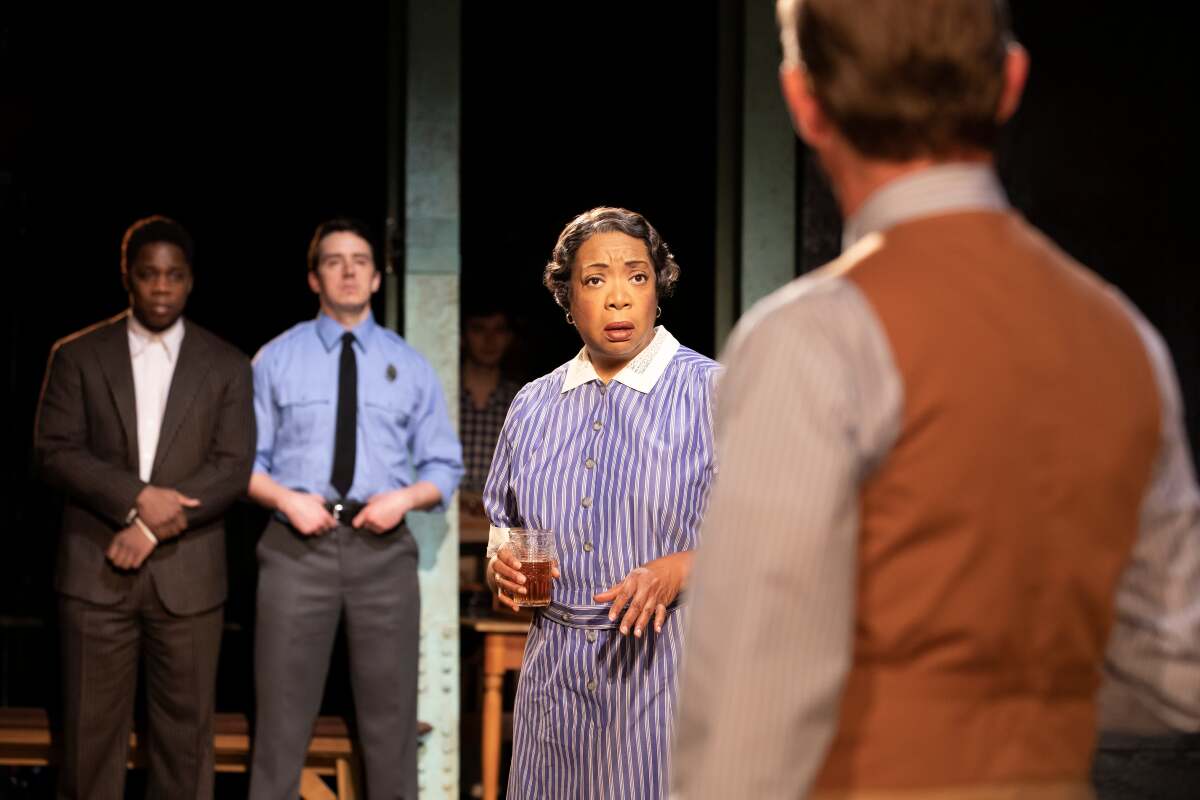Review: ‘To Kill a Mockingbird’ arrives at the Hollywood Pantages with troubling timeliness

- Share via
Harper Lee’s “To Kill a Mockingbird,” once a staple of junior high reading lists, has become a lightning rod for controversy. The hit Broadway adaptation by Aaron Sorkin, now on tour at the Hollywood Pantages Theatre in a production starring Richard Thomas, has followed suit.
The book, published in 1960, tells the story of attorney Atticus Finch, a widower raising two young children, Scout and Jem, in Maycomb, Ala., during the Great Depression. Asked to defend a poor Black man accused of rape by a white woman and her abusive father, Atticus reluctantly takes the case, aware that his family will be subjected to the inevitable communal backlash but confident that he can appeal to the basic goodness and sense of fair play of the jury.
Portrayed as a ruminative hero in Gregory Peck’s Oscar-winning performance in the 1962 film, the character of Atticus is at the heart of Sorkin’s reworking of the story. Scout (Melanie Moore) and Jem (Justin Mark) still receive a crash course in race relations, but now Atticus (Thomas) too undergoes a moral reeducation as his faith in the decency of his neighbors is shattered.
The Broadway touring production, retaining the elegant fluidity of Bartlett Sher’s staging, arrives at the Hollywood Pantages at a different cultural moment than when this version of “To Kill a Mockingbird” first opened in New York in 2018. A pandemic, the toxic fallout of Donald Trump’s presidency and a reckoning on race that was ignited by the murder of George Floyd have heightened awareness of the disparities and injustices built into the American story.
“To Kill a Mockingbird” was banned in certain schools for its use of racial epithets and for a plot hinging on a rape trial. It was further criticized for feeding “white savior” syndrome and for decentering the true victims of racist violence, Black Americans.
None of these issues have gone away. And Sorkin’s tampering with the book, to bring the tale more into alignment with contemporary sensibilities, undermines some of the novel’s complexities. Say what you will about Lee’s narrative choices, she knew the hearts and minds of the characters she wrote about. Correct thinking took a back seat to lived experience.
Sorkin’s ideological adjustments don’t always ring true, but this production of “To Kill a Mockingbird” offers a fresh perspective on a familiar story. The balance between idealism and realism is reset in a way that makes it impossible to screen out the depravity of old and enduring hatreds.
For all his integrity and commitment to social justice, Atticus can’t help coming across as a bit paternalistic. He knows that violent racist attacks are routine, yet his white privilege has protected him from the burden of this knowledge.
In Sorkin’s adaptation, the role of Calpurnia (Jacqueline Williams), the Finch family’s Black housekeeper and surrogate mother to Scout and Jem, is redeployed to challenge Atticus about the morality of their shared yet divided world. She keeps her opinions largely to herself, but she makes her displeasure known about the misguided faith he has in his fellow white citizens and the patronizing attitude he has toward the Black people he’s trying to protect.
‘Omar,’ the new opera by singer-songwriter Rhiannon Giddens and film composer Michael Abels, gets its West Coast premiere by L.A. Opera.
Their confrontation comes to a head when Atticus, defending his neighborly stance toward the racist dregs of Maycomb society, proudly asserts, “I believe in being respectful.” Calpurnia, tired of holding her tongue, replies, “No matter who you disrespect by doing it.”
The brutality of small men such as Bob Ewell (Joey Collins), whose daughter Mayella (Arianna Gayle Stucki) has accused Tom (Yaegel T. Welch) of sexual assault out of fear of her father, springs from a resentment too deep to be chalked up to economic conditions alone. The anti-Black pathology is generational, rooted in history, linked to social insecurity and awash in the ugliest of sexual projections.
One lesson Lee draws is how difficult it is to get inside the skin of another person, something Atticus is always encouraging his children to do. The truth is often hidden. Sometimes in shocking ways, as when men regularly seen at the market and hardware store appear at night as a lynch mob. But also occasionally in a heart-stirring manner, as when spooky neighbor Boo Radley (Travis Johns) turns out to be not the maniac Scout and Jem imagine him to be.
The Geffen Playhouse production of ‘The Inheritance’ superbly realizes playwright Matthew López’s vision. At 6½ hours long, it’s worth every minute.
“To Kill a Mockingbird” has a lot of story to dramatize, and Sorkin’s adaptation moves with smooth efficiency. The final stretch feels overextended as we approach the three-hour mark, but interest never stalls, no matter how many times you’ve relived the plot.
The production, which includes original music by Tony winner Adam Guettel (“The Light in the Piazza”), operates on an operatic scale. Miriam Buether’s scenic design doesn’t strive for cozy realism. The settings, enkindled by Jennifer Tipton’s lighting, are sketched against a lyrical, abstract background.
The acting is broader and less intimate than it was in New York. And a few of the accents are worn like wooden teeth. The performers tend to deliver their lines to the audience rather than to one another — another distancing element.
Thomas, who seems utterly impervious to aging, renders Atticus with brisk, no-nonsense strokes. Sorkin amplifies Atticus’ weaker traits, exposing the character’s all-too-accommodating nature. But Thomas doesn’t dig into the psychology. The role is intelligently worked out but played close to the surface.
As Scout, Moore is tasked with both narrating moments of the play and fully inhabiting the drama. Playing a tomboy with a thick Southern accent is an acting challenge rife with pitfalls, and Moore occasionally stumbles into cuteness. But the performance amiably guides us though the story.
Like Scout, Mark’s Jem and Steven Lee Johnson’s Dill, a young visitor to Maycomb who becomes fast friends with the Finch siblings, fill in as narrators. They’re both terrific — Mark in drawing out Jem’s maturing conscience, and Johnson in finding a believable eccentricity for Dill.
The cast includes Mary Badham (who was Oscar-nominated for playing Scout in Robert Mulligan’s landmark film) in the role of Mrs. Henry Dubose, a cantankerous old neighbor Atticus demands his children treat with courtesy. Richard Poe as Judge Taylor and Jeff Still as Link Deas bring as much individuality to characters on the right side of history as Collins’ Bob Ewell and Stucki’s Mayella bring to those on the wrong side.
But it is the two main Black performers who seem to most fully inhabit the realism of this fictionalized world. Welch’s Tom wears a look of grave resignation in the courtroom, knowing it will be a miracle if he escapes the electric chair for simply being unlucky and Black in the deep South.
Williams’ Calpurnia doesn’t have to say a word to make her angry truth felt. But when she speaks, she has a moral force that no one else — and certainly not Atticus in this incarnation — can match.
As white nationalism and antisemitism are once again boldly coming out of the shadows, infecting with ever more virulence the body politic of this ailing nation, the retelling of this story strikes a powerful chord. There’s no higher compliment to Lee’s novel than to say that “To Kill a Mockingbird” deserves to be fought over.
'To Kill a Mockingbird'
Los Angeles: Through Nov. 27 at Hollywood Pantages Theatre, 6233 Hollywood Blvd. 8 p.m. Fridays, 2 and 8 p.m. Saturdays, 1 and 6:30 p.m. Sundays. $39 and up. (800) 982-2787, BroadwayInHollywood.com or Ticketmaster.com. Running time: 2 hours, 50 minutes, including intermission.
Costa Mesa: Dec. 27-Jan. 8 at Segerstom Center for the Arts, 600 Town Center Drive. 7:30 p.m. Tuesdays-Fridays, 2 and 7:30 p.m. Saturdays, 1 and 6:30 p.m. Sundays. $29 and up. (714) 556-2787, scfta.org.
More to Read
The biggest entertainment stories
Get our big stories about Hollywood, film, television, music, arts, culture and more right in your inbox as soon as they publish.
You may occasionally receive promotional content from the Los Angeles Times.













